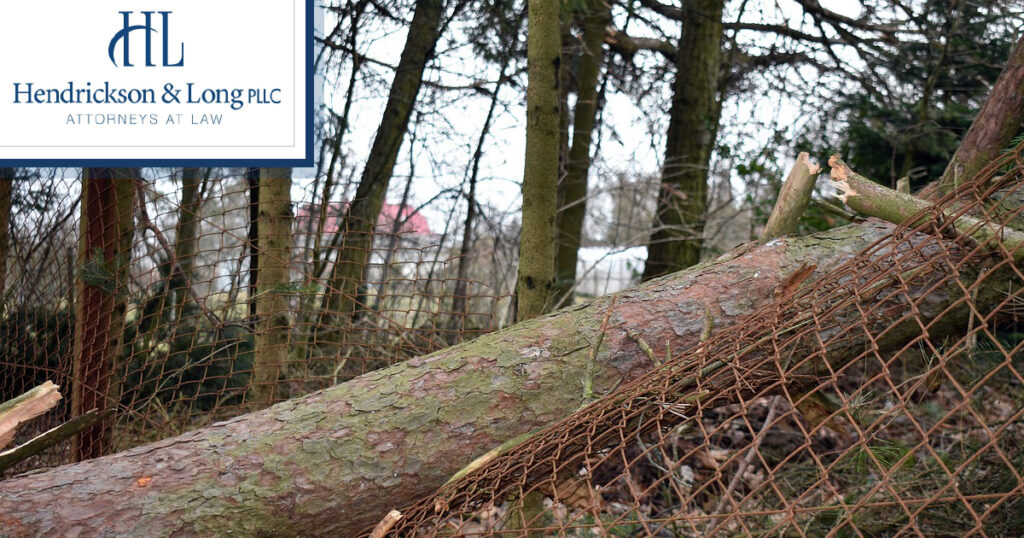Legal Options After My Property Has Been Damaged by Wind

As someone who resides here in West Virginia, you likely are well aware of how destructive thunderstorms and tornadic activity, along with high winds, have been over the past few days and, specifically, within the past 36 hours. This weather has caused catastrophic damage to homes and businesses across our state.
If you have property that has been damaged by catastrophic winds, you may have questions about your legal options. We’ll highlight some of your potential options below.
What To Know About the Destruction in West Virginia
The winds that blew through our state alongside thunderstorms on Tuesday, April 2, reached as high as 90 MPH. This was enough to cause flooding along with downed trees and powerlines, which not only created road blockages but also left an estimated 100,000 West Virginians without electricity.
Reports regarding injuries and potential fatalities are still coming in. However, an earlier interview by CNN with the WV Office of Emergency Management director suggests that in Fayette County alone, there were an estimated 13 homes with either major damage or completely destroyed by these high winds. He detailed how a number of residents had reported suffering injuries, but that they appeared to all be non-life-threatening.
The combination of property damage and injuries led to our state’s governor, Jim Justice, declaring a State of Emergency in counties most affected by this destruction, including Lincoln, Fayette, Nicolas, and Kanawha, yesterday.
Legal Remedies You Can Pursue if Your Property Sustained Wind Damage
Chances are that many of the residents whose houses were damaged or destroyed were likely covered by homeowners’ insurance or commercial property insurance (if your company has a physical office building).
If your home or business was affected and you indeed have this coverage, this is the best-case scenario for you. Insurance like this is specifically intended to protect you from incurring significant costs or altogether losing such a valuable investment when adverse weather events like these occur.
Generally, you’d simply reach out to your insurer after an unfortunate situation like this and let them know what happened and they’d send out a claims adjuster to your property to perform an assessment. However, all of this doesn’t carry any guarantee that they’ll pay on your claim.
Although it’s unlawful to just arbitrarily deny claims, some insurers will take their chances and do so anyway with the expectation they won’t get caught. Why do they do this? They do it to keep the amount they have to pay out on claims low. What reasons might they cite for denying your claim when they do this? When pushed to give a reason for the denial, they might say:
- The damage was pre-existing: They could say that it existed before you secured your policy or that there were known issues you simply failed to fix beforehand
- You didn’t take measures to mitigate damage: An insurance adjuster may say this if their contention is that you could have done more to secure your property to ward off destruction
- There were claims issues: An insurer may inform you that you didn’t properly fill out the claim form, didn’t include sufficient documentation, or didn’t file it by established deadlines
- Your insurance coverage wasn’t active: If you missed payments, it’s possible that your insurance company will claim your policy was no longer active
- Your insurance doesn’t cover what happened: This is an excuse they might provide depending on the type of insurance and the types of issues it covers or even if you have the right type of coverage but not enough in terms of policy limits
It’s also possible that an insurer passes the buck and claims that the damage is attributable to a manufacturing defect.
Finding Help in Recovering Compensation After Property and Personal Loss
Our seasoned litigators at Hendrickson & Long, PLLC have the required expertise to help you in your case. This includes if it was your West Virginia home or business alone that sustained damage or if you suffered serious injuries, too.
Each case is unique, which is why it’s important to discuss the specifics surrounding what happened to your property. We have all the expertise you need, including a comprehensive understanding of bad faith insurance tactics insurers sometimes use in cases like these and what legal options may be available to you in these and others, especially when you suffer personal injuries in the process as well.
Contact us to learn more about your potential legal options. Time is critical to the preservation of evidence in cases like these.

